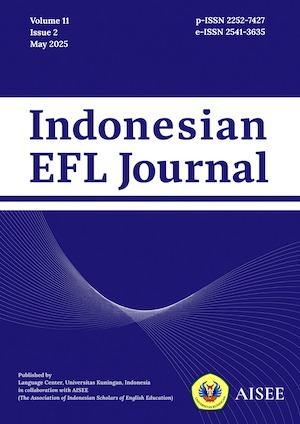FOSTERING CRITICAL THINKING SKILLS THROUGH SOCRATIC QUESTIONING: INSIGHTS FROM WIDYATAMA UNIVERSITY
Abstract
Abstract: This paper discusses the use of Socratic questioning method (SQM) to enhance students’ critical thinking capability. The method used in this research was descriptive – the method that describes a given state of affairs as fully and carefully as possible (Fraenkel, 1990:11). Twelve students of English Department S-1 Program sitting in the 4th semester participate in this research. This SQM is applied in learning process for the subject of Academic Presentation. Data were gathered through the two instruments, classroom observation and closed-ended questionnaires. The questionnaire consisted of ten items divided into six parts: understanding of SQM, critical thinking capabilities, application of SQM, effectiveness of SQM, perception of learning using SQM, and effects on critical thinking capability The results of the study indicate that: 1) the questions posed by the students are in level of analysis, 2) the contents of the questions posed cover identifying, relating, analyzing, and making inferences of the topics under discussion, and 3) the benefits of using SQM include provoking deep analysis, promoting critical thinking, making the one being asked think hard, maintaining learning motivation, and making students feel confident during the discussion sessions. The implementation of the Socratic Questioning Method (SQM) in the "Academic Presentation" course at Widyatama University has led to positive changes in students' learning experiences. SQM encourages students to engage in thoughtful dialogue, ask meaningful questions, and think critically. The findings suggest that SQM can enhance students' critical thinking abilities, foster deep analysis, and improve confidence and motivation in academic discussions.Key Words: Socratic Questioning Method (SQM), critical thinking, learning processReferences
Abidah, Unsia FU. (2022). RETAIN (Research on
English Language Teaching in Indonesia)
(e-Journal), pg 1-8 ISSN 2356-2617
Alwasilah, A. Chaedar. (2003). Language, Culture, and Education: A Portrait of
Contemporary Indonesia, Andira.
Bandung.
Campbell, Linda, et al. (2004). Teaching and
Learning through Multiple Intelligences,
Pearson Education Inc. Boston.
Elder, Linda, et al. (2010). Critical Thinking
Development: A Stage Theory with
Implications for Instruction, (Online)
http://www.criticalthinking.org/articles/ct-development-a-stage-theory, retrieved 24 June 2011.
Fraenkel, Jack R., et al. (1990). How to Design and
Evaluate Research in Education. New York:
McGraw-Hill Publishing Co.
Paul, Richard, et al. (1995). Critical Thinking:
How to Prepare Students for a Rapidly
Changing World, The Foundation for Critical Thinking pp.123-132.
Paul, Richard, Elder, et al. (2009). The Miniature
Guide to Critical Thinking: Concepts and
Tools, The Foundation for Critical Thinking.
Paul, Richard, et al. (1997). A Brief History of the Idea
of Critical Thinking, (Online)
http://www.criticalthinking.org/aboutCT/briefHistoryCT.cfm, retrieved 21 June 2011.
____ (2009). The Role of Socratic Questioning in
Thinking, Teaching, & Learning, The Critical Thinking Community-Foundation of Critical Thinking, (Online)
http://www.criticalthinking.org/page.cfm?PageID=522&CategoryID=71, retrieved 6 July 2011.
Peirce, Bill, (2004). Handbook of Critical Thinking
Resources, Prince George’s Community
College Faculty Members.
Scriven, Michael & Richard Paul, (1987). A statement
for the 8th Annual International Conference
on Critical Thinking and Education Reform,
(Online), http://www.criticalthinking.org/university/cthistory.htm, retrieved 27 June 2013
Verlinden, Jay, (2005). Critical Thinking and
Everyday Argument, Thomson Learning
Inc., Canada.









